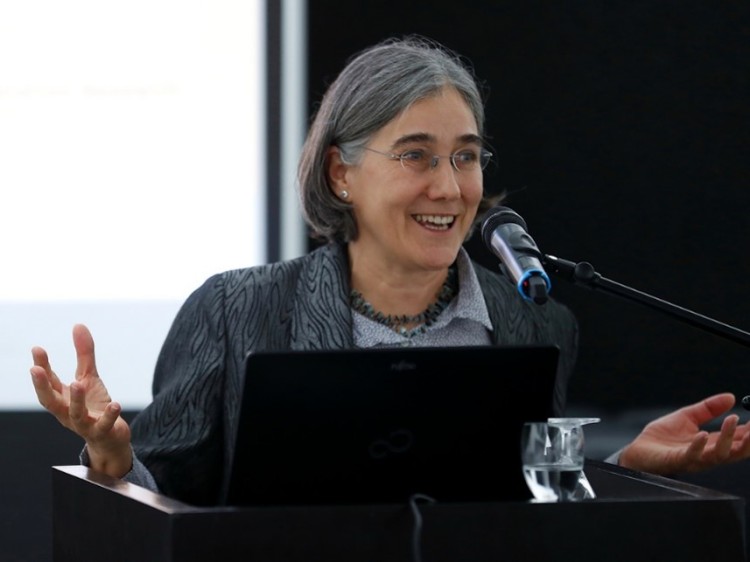How can we assess what a pioneering and lasting contribution to “the social sciences dealing with organization, organized
and organizing” is, as is required for anyone receiving an EGOS Honorary Membership. To do so, as a proxy, let me briefly
sketch what is particular for organization studies as a discipline – and not just particular, but particularly great:
-
Organization studies is truly transdisciplinary. At EGOS, business scholars meet sociologists and political scientists and anthropologists and communications scholars and also the occasional economist.
-
Probably because of its transdisciplinarity, organization studies is also characterized by great methodological openness and diversity. Organization studies was about mixed methods long before it was considered cool.
-
And, related to both these features, organization studies is a field that sports theoretical pluralism.
And this triad of transdisciplinarity, methodological openness and theoretical pluralism is also, what Sigrid not just contributed
to, but rather what she lived, what she exemplified, what she spearheaded.
The realm where most of her scholarly work is situated is the transnational – and already her choice of this term reveals
a lot about her differentiated and bordercrossing approach to research. At a time, when most people were talking about globalization
and the global sphere, Sigrid emphasized the continued relevance of national rules even in the context of “Institution Building
across Borders”, which was the title of her Research Group at the Max-Planck-Institute for the Study of Societies in Cologne.
In her work on transnational law firms with Glenn Morgen, her edited volumes with Marie-Laure Djelic on Globalization and
Institutions as well as on Transnational Communities and also in our joint work on IP regulation as a transnational practice,
she explored how national and transnational institutions interact and how norms may both be trickling-up and trickling-down,
thereby pushing for multi-level approaches to issues of global economic governance.
And given that the grand challenges we are confronted with as a society, first and foremost the imminent climate collapse,
are emphasizing the enormous relevance of exactly such multi-level approaches to global economic governance, I can hardly
think of any scholar whose work is more timely and relevant to be recognized than Sigrid’s.
Yet, there is a danger in laudations such as the one I am delivering here. Laudations tend to emphasize the greatness, they
tend to make the recipients of the honor larger than life. To some degree, however, this defeats one of the greatest legacies
an EGOS Honorary
Member can have: to serve as an example for those coming afterwards. Because how can all the mortals here aspire to reach
the seemingly superhuman level of excellence exemplified by the scholars receiving the honor?
And so, for the final part of my laudation, let me focus on Sigrid’s humanism – in all the various meanings this term could
have:
-
Sigrid’s research is firmly rooted in a humanistic worldview and ethos, both with respect to the research topics she chooses but also with regard to her personal research practice. As one of her co-authors stated it, Sigrid “has always recognized that our lives are more than publication-machines – we all have stresses, tensions and setbacks and Sigrid has always been very considerate and aware of those difficulties”. A perspective that her PhD and early career scholars particularly benefited from, as I had the luck to experience myself.
-
Probably this holistic and most emphatic perspective on her scholarly collaborators resulted from the simple fact that for Sigrid, ending up where she has, was anything but easy. Sigrid not just scholarly challenged – „shook up“, as a co-author referred to it – the very much male-dominated field around the National Business systems approach. She was the first in her family to not just attend university, but to then finish a PhD and become a Full Professor at a University. And all of this was really not handed to Sigrid on a silver platter. Actually, she even had to take a break during her PhD, she was most of the time raising a great child as a single mother, and, as I experienced first-hand, Sigrid has always not just challenged the scholarly status quo but first and foremost her own work, her own analysis and her own conclusions. Sigrid is a truly critical scholar, which includes being self-critical, as well.
- Finally, one of the most famous songs of Viennese Singer Wolfgang Ambros is titled “A Mensch möcht i bleibn” – a song about what it takes to stay human, whatever might happen. In preparation for this laudatio, I have conversed with several of Sigrid’s closest academic collaborators, and all of them shared their memories of an EGOS-related anecdote that took place at the EGOS Colloquium 2004 in Ljubljana. The following year, EGOS would take place in her then home-town Berlin. As one of the local organizers of the EGOS Colloquium 2005 in Berlin, she bounded onto the conference stage in full Berliner Bear costume to urge people to go to Berlin the next year. It was pretty hot – she must have been suffocating inside that full costume.
This brief anecdote tells you so much about what the greatest of Sigrid’s qualities as a scholar, as a friend, as a human are: Sigrid is brave, she is original, she is fully committed, she is unconventional, she is unpretentious – and, last but not least, Sigrid has a great sense of humor.
Sigrid, in the name of the whole EGOS community, let me thank you for all you did and still continue to do.

